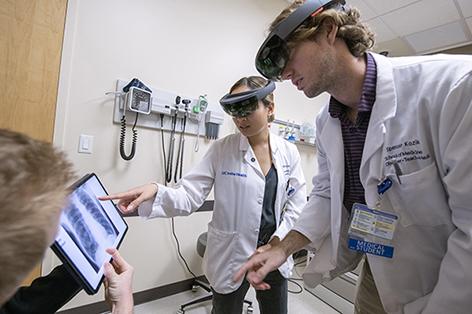Medical students participate in computer-based simulation that adds digital elements to a live view

Credit: UCI School of Medicine
Irvine, CA – January 7, 2019 – The UCI School of Medicine, in partnership with Chenega Healthcare Services, LLC and MedCognition, was awarded a $1.2 million contract through the Medical Technology Enterprise Consortium to examine the psychological effects of augmented reality (AR) medical simulation training.
Led by Drs. Shannon Toohey, Warren Wiechmann, and Megan Osborn from the UCI Department of Emergency Medicine, and Sarah Pressman, PhD, a professor of psychological science from the UCI School of Social Ecology, researchers aim to identify psychological and physiological effects of AR prototypes currently under development or currently used for medical simulation training.
“We will be using a MedCognition PerSim augmented reality medical simulation trainer to teach medical students about death and dying,” said Toohey. “We will evaluate the psychological and physiological effects of the augmented reality training on the students by measuring salivary cortisol levels, electrodermal activity and evaluating their affective state.”
Augmented reality involves the use of a computer-based simulation that adds digital elements to a live view, rather than providing a complete immersion experience that is found with virtual reality.
The two year study, titled, Assessment of the Psychological and Physiological Effects of Augmented Reality (APPEAR), got underway in December, and will focus on whether pre-existing psychological traits or past stress experiences influence the AR medical training experience and moderate the emotional responses to the simulation. Researchers will also evaluate whether the more realistic AR simulation will more successfully illicit realistic emergency situation-related emotional stress as compared to a standard medical simulator, in a medical student population.
The study is being done in coordination with the Medical Technology Enterprise Consortium and Chenega Corporation and is critical for assessing the limitations of AR that could impact learning effectiveness in military medical simulation training.
“Assessing the physiological and psychological effects of AR prototypes for military medical simulations is imperative to the technological development and refinement needed to deliver effective solutions to the combat soldiers. The outcomes of this work will be used to ensure that AR technology is safely and optimally utilized to enhance learning capabilities in medical simulation,” said Pressman.
###
About the UCI School of Medicine
Each year, the UCI School of Medicine educates more than 400 medical students, as well as 200 doctoral and master’s students. More than 600 residents and fellows are trained at UC Irvine Medical Center and affiliated institutions. The School of Medicine offers an MD; a dual MD/PhD medical scientist training program; and PhDs and master’s degrees in anatomy and neurobiology, biomedical sciences, genetic counseling, epidemiology, environmental health sciences, pathology, pharmacology, physiology and biophysics, and translational sciences. Medical students also may pursue an MD/MBA, an MD/master’s in public health, or an MD/master’s degree through one of three mission-based programs: the Health Education to Advance Leaders in Integrative Medicine (HEAL-IM), the Leadership Education to Advance Diversity-African, Black and Caribbean (LEAD-ABC), and the Program in Medical Education for the Latino Community (PRIME-LC). The UCI School of Medicine is accredited by the Liaison Committee on Medical Accreditation and ranks among the top 50 nationwide for research. For more information, visit som.uci.edu.
Media Contact
Anne Warde
[email protected]
949-824-6357
Original Source
https:/




